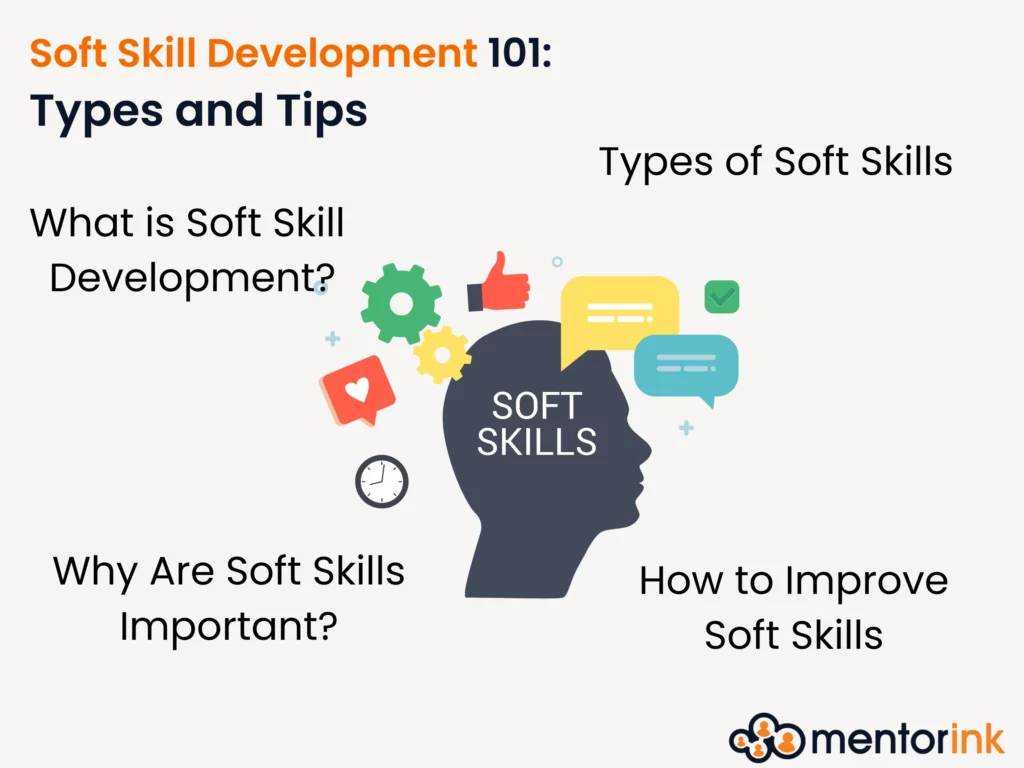
Employment opportunities are very competitive and move quickly nowadays. Soft skill development have been just as important, if not more so, than professional skills. More and more, employers are looking for people with good “soft skills” that help people work together, communicate, and solve problems at work. Soft skills, like being able to lead and change, are necessary for anyone who wants to do well in their career.
What is Soft Skill Development?
Soft skill development is the process of getting more proficient in non-technical skills that affect how you work, interact with other people, and solve problems. Hard skills are specific abilities that can be taught, like writing, coding, or accounting.
Soft skills, on the other hand, tend to be more subjective and harder to quantify. Some of these skills can be listed like leadership, communication, teamwork, and emotional intelligence. These are the kinds of skills that show how well you can work with others and deal with problems.
Soft skill development is the process of getting more proficient in non-technical skills that affect how you work, interact with other people, and solve problems. Hard skills are specific abilities that can be taught, like writing, coding, or accounting. Soft skills, on the other hand, tend to be more subjective and harder to quantify. Some of these skills can be listed like leadership, communication, teamwork, and emotional intelligence. These are the kinds of skills that show how well you can work with others and deal with problems.
This is important to have soft skills for both personal and career growth. As you progress in your position, you’ll need to improve your soft skills in order to manage teams, make deals, and run projects.
Studies have shown that people with adequate “soft skills” are more likely to be happy at work and have better chances of moving up in their careers.Spending time improving your soft skills can help you get along better with coworkers, clients, and bosses, and it can also help you handle difficult situations at work.
Types of Soft Skills
There are several key soft skills that are crucial in any professional setting. They can be listed as follows;
- Communication Skills
One of the soft skills employers often look for is good communication. It means being able to say what you want to say clearly, listen carefully, and have a productive conversation. In the workplace, it’s important to be able to get your point across clearly whenever you talk or write something.
- Teamwork
Collaboration is a vital component of any job. Being collaborative, encouraging, and adaptable in group situations are all parts of teamwork. Employees who possess good teamwork abilities may collaborate with their peers to accomplish common objectives, settle disputes, and foster a positive work atmosphere.
- Problem-Solving
Problem-solving is a key soft skill that involves analyzing situations, identifying issues, and finding effective solutions. Employers mostly value employees who can think critically and tackle challenges head-on, offering creative solutions to complex problems.
- Adaptability for Different Situations
In today’s fast-paced and ever-evolving work contexts, the capacity to adjust one’s behavior in response to shifting conditions or novel difficulties is highly prized. Employees that are able to adapt their strategy and maintain their flexibility in the face of unfamiliar circumstances are better suited to succeed in any capacity they may be assigned to.
- Leadership
Strong leadership skills are necessary for anyone looking to manage teams, lead projects, or take on more responsibility. Leadership encompasses decision-making, motivating others, delegating tasks, and setting a vision for the team.
- Emotional Intelligence
Among the types of soft skills emotional intelligence is somewhat crucial. Emotional intelligence refers to the ability to recognize and manage your own emotions, as well as the emotions of others. People with high emotional intelligence can navigate social situations effectively, resolve conflicts, and build stronger interpersonal relationships.
Why Are Soft Skills Important?
Soft skills are critical for success in the workplace because they help employees interact effectively, build relationships, and navigate challenges.
Increase the Productivity of the Workplace
Since they are able to communicate successfully, effectively manage their time, and work together with others, employees who possess excellent soft skills are more productive than those who do not carry out these talents.
Generally speaking, teams that possess a combination of strong communication, adaptability, and problem-solving skills are more likely to be successful in achieving their objectives.
Building of Better Relationships
Employees have the ability to improve their connections with their coworkers, managers, and customers by developing their soft skills, which include emotional intelligence, empathy, and active listening.
As a result of the fact that these interactions are necessary for teamwork, collaboration, and career growth, soft skills are an essential part of every professional setting.
Promote Career Advancement
When it comes to ascending the career ladder, developing good soft skills becomes essential. Employers who are interested in promoting individuals to managerial or executive roles place a high emphasis on employees who demonstrate leadership, communication, and teamwork skills.
Improving of Ability to Solve Problems
In all areas of business, facing obstacles and experiencing failures is an unavoidable reality. They are better suited to handle these challenges and create effective solutions, which makes them great assets to any firm. Employees that have good problem-solving skills are better qualified to handle these issues.
How to Improve Soft Skills
In professional life, having distinctive soft skills can help you to move better.Improving soft skills requires continuous effort and practice.
- Feedback
One of the best ways to improve soft skills is by seeking feedback from colleagues, supervisors, or mentors. Constructive feedback provides insight into how others perceive your behavior and communication, giving you a clearer idea of which areas need improvement.
- Active Listening
Focus on active listening to improve the way you talk to people. This means not only hearing what the other person is saying, but also getting what they’re trying to say, asking questions to make sure you understand, and responding in the right way. Listening actively helps people trust each other and work together better.
- Work on Emotional Regulation
To raise your emotional intelligence, you must first understand and control your own feelings. Learn how to handle stressful or emotional situations better by practicing self-awareness, focus, and emotional regulation. You will also be better able to understand and help other people.
To sum up, soft skill development is equally as valuable as technical expertise. These abilities, including communication, teamwork, and emotional intelligence, are critical for personal and professional success.
Focusing on building soft skills and always pursuing methods to improve them will not only make you a more productive employee, but will also open doors to more prospects for professional progression and leadership responsibilities.


